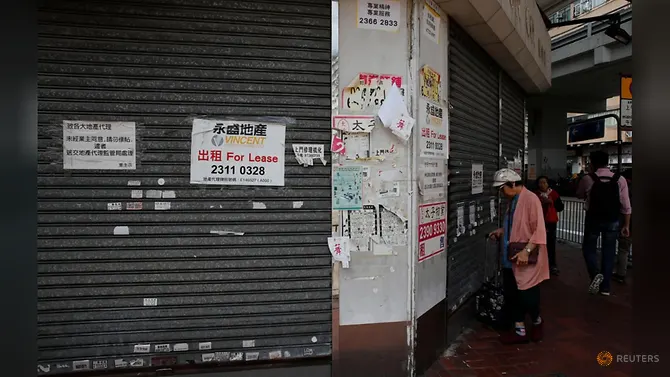Hong Kong shops shutter as months of protest darken economic gloom
29 October, 2019

Hong Kong jeweller Jun Lam has already closed one shop. His remaining outlet sits in an almost deserted shopping mall at the heart of a district regularly hit by sometimes violent protests that have rocked the Chinese-ruled city since June.
Restaurants, hotels and retail outlets like Lam's, many of which cater to mostly mainland Chinese tourists, form a central pillar of a small business sector that employs more than 1 million people in the city.
But with visitors deterred by months of violence, many firms have closed or are struggling to turn a profit.
"It's only a third of the pedestrian flow compared with the past. On some days, almost no shops were open in this mall," Lam said. To stay afloat, he has closed his other store in the New Territories district of Tseun Wan, the site of some violent demonstrations between protesters and police.
When Reuters visited The Capital shopping mall, where Lam's remaining shop sits, almost half the units were closed or emptied.
In the surrounding Tsim Sha Tsui shopping and hotel precinct, many shutters on closed shops bore "To Let" signs or letters from landlords demanding rent.
Just last Sunday, the district was blanketed in tear gas during cat-and-mouse clashes between police and protesters.
It was the 21st consecutive weekend of protests over fears Beijing is tightening its grip on the territory, the worst political crisis since colonial ruler Britain handed Hong Kong back to China in 1997.
The unrest has dealt a double blow to the financial hub, which was already grappling with sluggish economic growth.
Government support has been modest, and there is little optimism amid a record decline in retail sales, rising unemployment and bankruptcies that have started to hit banks' bottom lines.
Larger firms impacted by the protests can often fall back on their wider footprint, access to emergency capital or international business, industry watchers say, but for many small firms there is no such safety net.
"It's a very serious situation," said Brian King, associate dean of the School of Hotel and Tourism Management at Hong Kong Polytechnic University.
"There is no buffer for the owners - it's not easy for them to get loans and there's not a particularly strong welfare system in Hong Kong."
"WAITING TO DIE"
Confirming the city entered recession in the third quarter, the city's finance chief Paul Chan on Sunday urged an end to violence.
Chan earlier this month said at least 100 restaurants have closed due to the unrest with about 2,000 employees affected.
Hong Kong is home to around 340,000 small and medium sized firms, according to official figures, providing jobs for about 1.3 million people. That accounts for around 45 per cent of total employment, excluding the civil service, and 98 per cent of business units covered by quarterly government surveys.
High street rents in the city, among the most expensive in the world, fell the most since the 1998 Asian financial crisis in the third quarter, while authorities have repeatedly called for landlords to cut rents during the crisis.
But, for many small firms, that may not be enough to stave off closure.
"Many stores are waiting to die," said Bob Yip, operator of Wing Li Dispensary, located on the popular protest route of Causeway Bay on Hong Kong island.
Yip said his business, which mainly caters to tourists from mainland China, has dropped by 80 per cent, while his local custom has dwindled due to regular closures of the transport network during the protests.
Yip said the government was not doing enough to resolve the disputes with demonstrators.
Others say police tactics are making the situation worse.
On Sunday, a tear gas canister landed inside a pharmacy during clashes in Yau Ma Tei district, sending spluttering shoppers and workers fleeing from the cramped, smoke-filled store, local media coverage of the incident showed.
The shopkeeper, surnamed Wu, told local media four representatives of the police visited the store on Monday morning and said they were sorry, without explaining why tear gas was fired at the pharmacy.
"We already half-closed our shutter when the tear gas canister was thrown into our shop suddenly," Wu told local broadcaster RTHK. "We all ran outside. There weren't many people on the streets but the police fired tear gas nevertheless."
